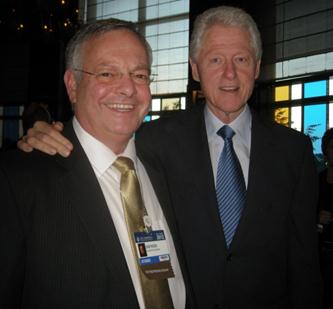I recently participated in the Clinton Global Initiative that was held in Chicago on June 7th and 8th. It really was a fascinating event in many respects. The agenda can be found at: http://www.cgiamerica.org/2012/agenda/. The basic thread was what specifically can be done to put America back to work. There were a slew of great speakers and breakouts. I was invited to help guide the Entrepreneurship sessions.

Dan Rosen & President Bill Clinton
It is impressive to see what former President Clinton can get companies and individuals to do there were specific commitments to create programs, hire returning veterans, and great discussions and commentary about what has gone wrong and what can be done.
Several highlight comments:
- Bill Clinton talked about the need for “creative cooperation” instead of the partisanship that is choking our political process.
- He also talked about transforming our society to one that is sustainable, citing Costa Rica which has 26% national parks, is 51% forested, and has 92% of its energy (going to 100%) from renewables. He saw this model as a challenge model for the US.
- Fareed Zakaria had a memorable quote, when saying he didn’t have a PowerPoint: “People who use PowerPoint rarely have power and never have a point.”
- He then discussed the impact of two concurrent revolutions globalization and technology and how they are a “pincer movement” on American employment, where the American worker is stuck in a bad place, because we have had a divergence of capital and labor.
- He cited that most countries have a cabinet level position to enhance tourism (“every tourist is a walking stimulus program”), where the US has a cabinet level position to prohibit tourism.
- Rahm Emanuel, the new mayor of Chicago, cited the need for cities like Chicago to stop looking to Washington, DC or Springfield (the Illinois state capital) for help or answers; “the reinforcements aren’t coming.” He talked about programs he has done locally to help the city and employment in public-private partnerships and how he has gotten the cooperation of the unions.
- He also made some interesting global comments about the economy. Apple, one of our most successful companies by any measure has over $100B in revenue, but only employs 40k people in the US. But, Foxcon, which make many of its products, employs over 1M people, primarily in China, to build Apple’s products.
- Clinton: “I was just in Silicon Valley meeting with business leaders. I was told that, if we had the workers with the right skills, we would hire 3M people.” This was a segway to discussion about education.
- I was really impressed by Ai-jen Poo, Director, National Domestic Workers Alliance. He spoke eloquently about the need to change both models and training in financial education. Paraphrased: “today the role models in disadvantaged communities are drug dealers and rap stars. They are successful and rich. We need new role models that bring financial dignity and literacy. Today, in these communities, you have liquor stores, pawn brokers, payday loans, and drug dealers. If you could raise the average credit score from 500 to 650, then you would transform them to convenience stores, credit unions and banks, and thriving businesses. This requires making “smart” sexy. And teaching and giving financial literacy and financial dignity.” Truly inspiring.
- Clinton (in his second keynote) talked about Lincoln. In the teeth of the Civil War, he did the following:
- Created the transcontinental railroad;
- Created the National Science Foundation;
- Chartered the land-grant universities
- Others
- And wrote the Emancipation Proclamation.
He was clearly in the “Future Business.” This is what we need now!
- Kasim Reed, Mayor, City of Atlanta, said: “Being a mayor is where hope meets the street. It is a question of will doing the right thing even when the cost is high.”
- Another passionate and brilliant speaker was Neil deGrasse Tyson, Astrophysicist and Director, Hayden Planetarium, American Museum of Natural History. He said (paraphrase): “Getting students to study the hard STEM topics is more a question of inspiration than knowledge. We need to inspire our youth.”
The only downside for me was the seeming confusion between lending and equity. There was much discussion about helping small business and a lot of confusion about loans as investment. We angels have our work cut out for us.